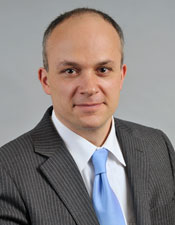Sep 7 2015
Franz M. Geiger is leading a team of Northwestern University scientists involved in a multi-institutional research center that just received a five-year, nearly $20 million renewable grant from the National Science Foundation to study nanoparticles in emerging technologies and their effects on the environment.
 Franz M. Geiger
Franz M. Geiger
Based at the University of Wisconsin-Madison, the Center for Sustainable Nanotechnology now has expanded to 12 institutional partners from across the country. The grant supports the center’s focus on the “molecular mechanisms by which nanoparticles interact with biological systems.”
Much remains to be learned about how nanoparticles affect the environment and the multitude of organisms -- from bacteria to plants, animals and people -- that may be exposed to them. The center’s goal is to use fundamental chemistry to enable the development of nanotechnology in a sustainable manner, for societal benefit.
Geiger, professor of chemistry in the Weinberg College of Arts and Sciences, and his team will utilize their unique nonlinear optics laboratory to develop new imaging techniques and provide testing grounds for nanoparticles created by other center members.
The research team wrote in a recent article in the journal ACS Central Science: “We need to ask: What will we need to know about new nanomaterials that are to be produced on a large scale if we wish to avoid negative outcomes, while at the same time take advantage of what these new materials offer?”
Imagine what kind of chemical and molecular insights scientists would have needed to prevent the negative effects of something such as asbestos or the ozone hole.
“New technologies and mass consumer products now are emerging that feature nanomaterials as critical operational components,” Geiger said. “Our center, which started three years ago as a much smaller enterprise, is now well-equipped to tackle the challenge of studying engineered nanomaterials once they enter the environment -- both the negative and positive aspects.”
Much of what the Center for Sustainable Nanotechnology does is focused on establishing causality, as opposed to reporting correlations.
“We can upend the existing paradigm in nanomaterial production towards one in which companies design nanomaterials to be sustainable from the beginning, as opposed to risking expensive product recalls -- or worse -- down the road,” Geiger said. “Tackling this grand challenge requires a trans-disciplinary team, which is now assembled in our Phase II center.”
Geiger’s team includes Merve Dogangun, Alicia McGeachy, Laura Olenick and Julianne Troiano, all doctoral students in his lab. Also working on center projects and contributing to the center’s blog, “Sustainable Nano,” are undergraduates Ese Ehimiaghe, Alec Kinczewski and Jo Machesky.
Nanotechnology involves the use of materials at the smallest scale, including the manipulation of individual atoms and molecules. Products that use nanoscale materials range from beer bottles and car wax to solar cells and electric and hybrid car batteries. If you read your books on a Kindle, quantum dots, a semiconducting material manufactured at the nanoscale, underpin the high-resolution screen.
And while there are already hundreds of products that use nanomaterials in various ways, there are still lots of unknowns about how these modern materials and the tiny particles they are composed of interact with the environment and living things.
“The purpose of the center is to explore how we can make sure these nanotechnologies come to fruition with little or no environmental impact,” said Robert J. Hamers, who directs the center and is professor of chemistry at UW-Madison.
“Some of the big questions we’re asking are: How is this going to impact bacteria and other organisms in the environment? What do these particles do? How do they interact with organisms?”
In addition to Northwestern and UW-Madison, scientists from UW-Milwaukee, the University of Minnesota, the University of Illinois and the Pacific Northwest National Laboratory have been involved in the center’s first phase of research, which began in 2012.
Joining the center for the next five-year phase are Tuskegee University, the University of Maryland-Baltimore County, Johns Hopkins University, the University of Iowa, Augsburg College and Georgia Tech.